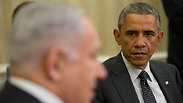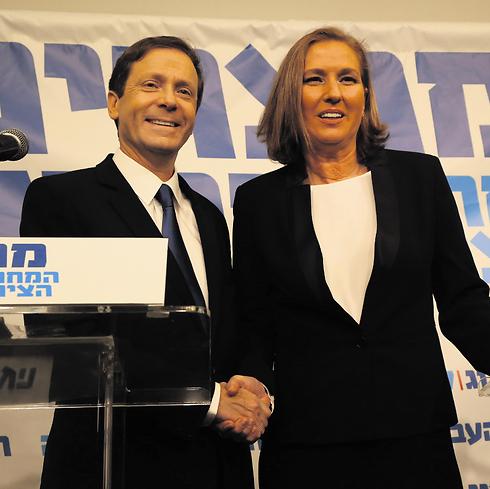
Obama and Netanyahu. American president prefers a coalition led by Herzog and Livni
צילום: AFP
Obama's chance to get back at Netanyahu
Op-ed: US president and his associates would love to punish Israeli prime minister for meddling in 2012 presidential election, but they had better restrain themselves. A blatant intervention in Israeli elections could achieve the opposite result.
US President Barack Obama likely never dreamed that such an opportunity would fall into his hands: Getting back at Prime Minister Benjamin Netanyahu for intervening in the 2012 presidential election in favor of his Republican rival, Mitt Romney, and maybe even getting a new government in Israel, which would make it much easier to achieve an agreement with the Palestinians.

Democratic presidents preferred prime ministers of coalitions led by the left or center and got along with them better. Republican presidents had good relationships with prime ministers from the right and center as well.
In the 1977 elections, the Democratic Jimmy Carter preferred a government led by the Alignment (the two parties which later merged into the Labor Party), and until the peace agreement with Egypt, he often clashed with Prime Minister Menachem Begin.
The Republican Ronald Reagan got along with Begin and Yitzhak Shamir, but his successor, George H. W. Bush, preferred Yitzhak Rabin. Bill Clinton had an excellent relationship with Rabin, Shimon Peres and Ehud Barak, and tense relations with Netanyahu.
The Republican George W. Bush got along with Ariel Sharon and Ehud Olmert, who moved from the right to the center. In the 2009 elections, Obama favored Tzipi Livni but got Netanyahu.

Herzog and Livni. Obama will try to help them in a subtle or blatant manner (Photo: Shaul Golan) (צילום: שאול גולן)
All the attempts made by one country to meddle in elections held in the other country achieved nothing. When he was Israel's ambassador to the United States, Rabin supported Richard Nixon's reelection. In 1976, Ezer Weizman was in favor of Carter's election. These two interventions stemmed from inexperience and were pointless.
Netanyahu's intervention in the latest presidential election had no impact on the result and poisoned his relations with Obama even more.
There were similar on the other side. Carter's attempt to prevent Begin's election in 1977 failed. Ahead of the 1992 elections, Bush Sr. lashed out at Shamir, but Rabin won for other reasons. Clinton's aid to Peres against Netanyahu in the 1996 elections didn't help.
The Israel-US ties have not been a key issue in the elections campaigns, both in the US and in Israel. This trend was violated in the 2012 presidential election, when Romney blasted Obama over his attitude towards Israel and Netanyahu.
The Israeli opposition can use Netanyahu's poor relations with Obama against him. It may be a legitimate election topic, but engaging in it excessively during elections, both here and there, damages the relationship between the two countries.
US Ambassador to Israel Dan Shapiro said several days ago that US presidents can still initiate and vigorously advance foreign affairs during their last two years in office. He presented several examples, including Clinton's efforts, up to his very last moment in office, to get Barak and Yasser Arafat to agree on an overall agreement between Israel and the Palestinians.
He added that such moves can be taken without the Congress' approval. The ambassador was implying that after the elections, Obama would try to resume and advance the negotiations with the Palestinians, even if the new Republican Congress gives him a hard time.
Obama prefers a coalition led by Isaac Herzog and Tzipi Livni. He will try to help them in a subtle or blatant manner. Kerry has already taken a step in that direction when he said he would like Israel to have a government which would resume negotiations with the Palestinians. In other words, a government which would not be led by Netanyahu.
Although Obama and his associates would very much like to get even with Netanyahu for meddling in the 2012 presidential election, they had better restrain themselves. A blatant intervention in the Israeli elections could anger the voters and achieve the opposite result.
There is not a nation in the world which approves of external elements swaying the elections in favor of their desired government.
Prof. Eytan Gilboa is the director of the School of Communication and a senior research associate at the BESA Center for Strategic Studies at Bar-Ilan University.










